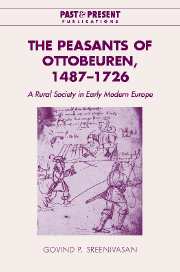Book contents
- Frontmatter
- Contents
- List of figures
- List of maps
- List of tables
- Acknowledgements
- Note on weights, measures, and currencies
- Map 1 Southern Germany, c. 1620
- Map 2 The lands of the monastery of Ottobeuren, 1620
- Introduction
- 1 Right and might (c. 1480–c. 1560)
- 2 The discrete society (c. 1480–c. 1560)
- 3 A crisis of numbers? (c. 1560–c. 1630)
- 4 Integrity and the market (c. 1560–c. 1630)
- 5 Living on borrowed time (c. 1560–c. 1630)
- 6 To empty and to refill (c. 1630–c. 1720)
- Conclusion
- Bibliography
- Index of places
- General index
- Past and Present Publications
1 - Right and might (c. 1480–c. 1560)
Published online by Cambridge University Press: 21 July 2009
- Frontmatter
- Contents
- List of figures
- List of maps
- List of tables
- Acknowledgements
- Note on weights, measures, and currencies
- Map 1 Southern Germany, c. 1620
- Map 2 The lands of the monastery of Ottobeuren, 1620
- Introduction
- 1 Right and might (c. 1480–c. 1560)
- 2 The discrete society (c. 1480–c. 1560)
- 3 A crisis of numbers? (c. 1560–c. 1630)
- 4 Integrity and the market (c. 1560–c. 1630)
- 5 Living on borrowed time (c. 1560–c. 1630)
- 6 To empty and to refill (c. 1630–c. 1720)
- Conclusion
- Bibliography
- Index of places
- General index
- Past and Present Publications
Summary
History does not record when Anna Maier was born; neither does it record when she died. It does pay rather closer attention to her older brother Johann, who entered the world perhaps two years before his sister in November of 1486, and predeceased her by at least twenty-five years in February of 1543. Both siblings grew up in the Upper Swabian village of Egg, in what is now part of the German province of Bavaria, and was then the lordship of the Benedictine monastery of Ottobeuren. Johann left Egg at the age of eight to be schooled by his uncle Martin Maier, a priest in the city of Rottenburg. The boy went on to study philosophy, law, and theology at the universities of Heidelberg, Cologne and Freiburg, changed his name to Johann Eck, and rose to fame (and notoriety) as the theologian who locked horns with Martin Luther at the Leipzig disputations of 1519. As for Anna, whose story this is, she remained in Egg and inherited the family farm.
The Hof, as a large farm like this was called, had originally been held by Anna's grandfather. It came to her father, Michael Maier, in 1483, and sometime around the year 1515 passed to her husband, Thoma Schaupp. It was the largest Hof in Egg, measuring some 110 jauchert or 46.5 hectares, and it instantly made Anna's household one of the richest in the village.
- Type
- Chapter
- Information
- The Peasants of Ottobeuren, 1487–1726A Rural Society in Early Modern Europe, pp. 9 - 50Publisher: Cambridge University PressPrint publication year: 2004



